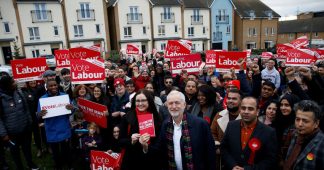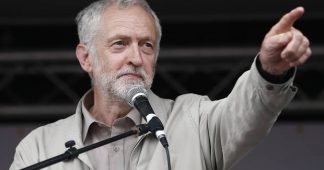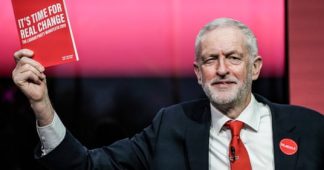If elected, the next Labour government can finally depart from the neoliberal consensus and deliver a major shift in wealth and power, argues Adam Peggs
December 5, 2019
While Labour is offering hope and large-scale change of the kind that hasn’t been seen for more than a generation, their opponents are offering no serious vision for the future. The Conservative’s programme, like their modest spending pledges, is particularly negligible. Boris Johnson’s cabinet is firmly rooted in the ideas and tropes of 1980s Thatcherism. His party’s manifesto lionises ‘the free market’, the ‘profit motive’ and ‘low taxes’. Hence one of the few ideas that doesn’t represent continuity with his predecessor, Theresa May, is its talk of ‘freeports’ – deregulated, low tax zones within the UK. These ideas show Johnson’s Conservatives to be a crude re-run of Thatcher’s version at its height.
Neoliberalism – our current economic system, installed by Thatcher – is some forty years old and long past showing signs that it is untenable. The neoliberal maxims: deregulation for businesses; privatisation and marketisation of public services; opposition to trade unions, and the glorification of greed, seem less popular than ever. What public enthusiasm existed for neoliberalism has faded. Current waves of protests across Chile – one of the first countries to pursue an aggressively neoliberal system, under dictator and friend of Thatcher Augusto Pinochet – indicate that the doctrine is no longer tolerated in its heartland. Thatcher’s certainty that Britain would continue to follow a neoliberal trajectory now looks far less secure.
The neoliberal offensive against working people is still very much ongoing, however. This is demonstrated by workers’ shrinking share of national income; by the drastic fall in trade union organising since the 1980s; by the decades-long stagnation of living standards for Britain’s poorest people, and by markedly high levels of income and wealth inequality. After Russia, the UK is economically the most unequal country in Europe.
Neoliberal policy has taken away most of our public assets, reduced public space, sold off vast swathes of public land (some 10 per cent of all land has been privatised), fragmented and undermined public services and greatly increased individual financial insecurity. It has effectively produced private affluence for a shrinking few, and public and private squalor for many.
In housing in particular, we have seen the growth of deprived, substandard housing conditions and of housing insecurity, as well as severe concentrations of housing wealth. The ‘property-owning democracy’ promised by Thatcher – arguably the key to making the whole model palatable, if not popular – has failed to deliver for the majority.
There is an alternative
Over the past few years Labour has constructed a detailed and serious alternative. Rather than return to the post-war economic model – which was overly managerial, often overly bureaucratic and dependent on constant job creation – the Party has moved toward a fundamental alternative.
The Labour programme, notably bolder than in 2017, amounts to a blueprint for a radically fairer society. Its manifesto promises are more universalist than the ideas of the post-war era, less tied to ‘the work ethic’ and both more democratic and more participatory. The commitment to reducing the length of the working week to 32 hours within a decade, for example, is a push for working people to be given more free time. While work hours progressively fell during the post-war decades, this Labour would be the first government explicitly aiming to shorten the working week.
Then there are the Inclusive Ownership Funds – a proposal to give workers a stake in large companies – which would shift power and resources into employees’ own hands, extending democratic practices into the economy. Bernie Sanders’ iteration of this policy demonstrates that even more radical versions of such ownership funds have popular support.
Challenging the idea that financial services can only be run in the private sector, Labour have also unveiled plans for a Post Bank, a public sector retail bank operating out of the Post Office. This would follow similar models in France, Japan and Britain’s Girobank, which privatised in the Thatcher era. Alongside a new, publicly owned National Investment Bank, Labour are making a notable attempt to reshape the financial sector. Where the Attlee government left commercial banking exclusively to private competition, Corbyn’s Labour has pledged not to do so. This would open up the possibility of banks bound not by the profit motive, but by social objectives and democratic accountability. Costa Rica’s Banco Popular, with an assembly as its highest governing body, offers one model for this plan.
In the runup to the launch of the manifesto, Labour also announced plans to introduce free full-fibre broadband as a universal basic service – based on the same simple principle as free libraries. The social benefits of such a policy are likely to be enormous. This simple idea reflects Labour’s broader objective of extending public services rather than just defending those which already exist; of ambitiously looking beyond rather than merely reversing Thatcherism.
Labour’s emerging programme recognises that many of the problems we face are down to what Martin O’Neill and Joe Guinan describe as ‘the deep structural determinants’. Proposed policies reflect the Party’s understanding that the left needs to change people’s relationship to work and society, by increasing leisure time, expanding the ethos of public services, broadening access to information and handing the masses a real stake in the economy. Implementing this political agenda would be no easy task, but with significant popular support it can be done.
After four decades of dominance, the market-worshipping consensus has decayed, weighed down by its own contradictions. The polarised, insecure, atomised society it has created might fade away with it. The problems that confront us won’t simply be resolved in a General Election, but December 12 could mark the beginning of an overdue process.
* Adam Peggsis a writer and activist based in Hackney, London.
Photo by Guillaume Paumier, used under CC license.
Published at https://www.redpepper.org.uk/election-2019-the-end-of-neoliberalism-in-sight/











